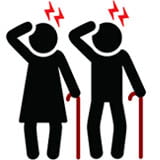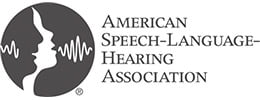Speech Therapy for Adults
Your Journey To Regaining Valuable Skills Necessary To Communicate. Speech Therapy Available In The South Bay, West LA, And Greater Los Angeles. We Will Come To You, Your In Home Speech Therapist.
Your Journey To Regaining Valuable Skills Necessary To Communicate. Speech Therapy Available In The South Bay, West LA, And Greater Los Angeles. We Will Come To You, Your In Home Speech Therapist.
Adults May Experience Speech, Language, Voice, Swallowing, And Cognitive Deficits For A Variety Of Reasons. When One’s Safety And Quality Of Life Are At Stake, Effective Techniques Are A Must. Evidence-Based Practice Is Key In Successfully Treating Complex Conditions. That’s Why I Only Engage In Procedures That Have Been Proven To Yield Improvement.

Stroke, or cerebral vascular accident (CVA), deprives the brain of valuable oxygen. Lack of blood flow can result in reduced speech clarity, poor language comprehension, and difficulty thinking of words or putting words together to form sentences. Aphasia is a communication disorder, which affects a person’s ability to understand or express spoken and written language. There are several types of aphasia and treatment options vary depending on type and severity.

Traumatic brain injury (TBI) is most frequently caused by car accidents, firearms, and falls. Depending on the severity of the injury, the effects can vary from temporary confusion to long-term cognitive deficits. Cognitive-communication intervention, compensatory strategy, and metacognitive skills training are just several treatment methods that can capitalize on strengths and address weaknesses related to cognition and communication.

Parkinson’s disease is a progressive neurological condition that affects movement. This often results in a hoarse voice, slurred speech, slow or fast speech, monotone or quiet voice, and reduced facial expressions. Lee Silverman Voice Training (LSVT LOUD) is an evidence-based treatment designed specifically for people with Parkinson’s disease to address loudness and clarity. Myofascial release can also be utilized to facilitate flexibility of the pharyngeal musculature.

Cancer can be localized or widely spread. Head and neck cancer symptoms vary from patches on the tongue or lining of the mouth to lumps in the throat, changes in voice quality, and pain on swallowing. Exercise-based resistance training of oral and pharyngeal muscles improves the strength and movement of these structures. Myofascial release is a science-based manual therapy utilized to relieve pain and discomfort associated with chemotherapy and wound healing.
When most people think of speech therapy, the first thing that comes to mind is articulation, or how someone sounds when they speak. While articulation is part of speech therapy, speech therapy involves more than pronunciation. Speech therapy can help people with the expression of language, understanding of language, and higher level cognitive-communication skills. Speech therapy also helps people overcome communication problems associated with voice, fluency, language, oral motor, and swallowing deficits. Speech therapy aims to help individuals communicate effectively.
Adults may need speech therapy for a variety of reasons. For example, a person may need speech therapy when a person has a stroke or an accident involving the head. The goal of speech therapy as an adult is to establish functional communication after these types of traumatic accidents. Whether through verbal communication or an AAC device, adults will work closely with a speech therapist to establish a way for them to communicate. Speech therapy for adults can also be indicated when someone has other diagnoses such as ALS, Parkinson’s disease, Dementia, or Head and Neck Cancer.

Speech therapy is essential in managing speech disorders that develop in kids and adults. Speak Live Play’s licensed and credentialed speech therapists offer a wide range of services to diagnose and treat injuries and conditions that affect speech, swallowing, and voice capabilities. Our highly trained and licensed speech–language pathologists have expertise in a full range of neurological and medical conditions that will help you or your loved one achieve their communication goals.
Our speech-language therapists also work with individuals who have undergone surgeries and other procedures for treating neck and head conditions (such as head and neck cancer), assisting them in restoring a clear, strong voice or establishing other ways for them to communicate. Our speech therapists are trained in tracheostomy patients and laryngectomy patients, as well as the different ways these patients communicate. Whether you are looking for immediate care or planning to seek the services in the future, contact Speak Live Play today. Our representatives are ready to talk to you about your concerns. We have multiple communication methods for you to get in touch with us using mobile phones, texting, online chat, and form requests. Whether you have a question about our services, want to schedule an appointment, or need to ask a question with a concern, we are here for you.

At Speak Live Play, our brand voice is one of compassion and expertise. We understand the challenges that come with communication and speech disorders, and we are dedicated to helping individuals overcome them. With a team of highly skilled speech-language therapists (SLPs), we possess vast expertise in effectively treating various neurological and medical conditions that impact speech, language, and swallowing. Our unwavering dedication to excellence distinguishes us as we deliver tailored care to every individual, ensuring a truly personalized experience.
We also recognize the importance of treating not just the physical aspect but also providing emotional support throughout the journey toward improved communication. Our therapists pride themselves on becoming your advocate, your speech professional, and an integral part of your rehabilitation process. We strive to establish a secure and inviting atmosphere where our valued clients can freely express themselves and feel at ease. Concerns and working towards their goals.
At the core of our philosophy lies the firm belief in providing personalized care that is precisely tailored to meet the distinctive needs of each individual we serve. We recognize and value the importance of understanding the unique requirements of every person, enabling us to deliver care that is truly exceptional and meaningful. Our SLPs will work with our clients hand in hand through the whole process of the evaluation, setting a plan, goals, and timeline to help you achieve them. No matter the timeline, Speak Live Play will be there for you to provide evidence-based, quality speech therapy to help you meet your goals.
Speech therapists are highly skilled professionals who are equipped to work with individuals across all age groups, ranging from newborns to older adults. While it is commonly believed that speech therapy primarily focuses on children, a significant portion of our patients seeking treatment are adults. This can be attributed to the fact that adults often have unique communication requirements that differ from those of children.
Speak Live Play’s SLPs will use their extensive knowledge of the body’s language system to help patients overcome their struggles and improve communication skills. Some of the common problems treated by SLPs include:
– Trouble saying certain words or sounds
– Difficulty swallowing food or liquid
– Problems remembering or understanding words
– Stuttering (speaking fluently)
– Difficulty moving the mouth to make sounds
Adult patients tend to seek treatment for stroke, brain injury, neurological diseases, voice problems, delayed language development, or cognitive disorders. Speech-language pathologists (SLPs) often work with other professionals in interdisciplinary teams, such as audiologists, nurses, and physicians. If you are an adult who needs help with communication skills, there are many reasons for you to see an SLP.
A large part of an SLP’s job is helping patients be able to eat and drink/swallow again after a prolonged illness, stroke, or head and neck cancer. An SLP can help you improve your swallowing skills and ability to tolerate foods by mouth. They can assess your swallowing skills and determine if you need any treatment or therapy. Then, they will create a plan of action that will help you improve those skills. The SLP may also recommend you consult with an ENT specialist (Ear, Nose, and Throat) or a GI specialist (Gastrointestinal).
If you’re having difficulties with your speech, an SLP can help! They can assess your overall communication skills and how your speech sounds and determine if any therapy or treatment is needed. You might have trouble saying certain sounds or words because of a stroke, brain injury, or other health concern. Our SLPs will provide individualized treatment for your communication goals.
Cognitive development problems are essentially problems with the way your brain works — these can include memory loss, difficulty concentrating, and other related issues. People who have suffered brain injuries may experience cognitive development problems as they recover from their injuries; however, these problems don’t always go away after an injury has healed.
Communication is essential in everyday life. It enables us to express our feelings and needs, build relationships, learn, and make decisions. When you suffer from complete or partial loss of voice, you may feel afraid, alone, and frustrated. Unfortunately, various conditions, such as traumatic brain injury, stroke, and cancer, contribute to speech disorders and need for skilled speech therapy.. Speech therapy services for adults help empower people with speech problems, allowing them to speak effectively. Adult speech disorders are common and come in various forms, including voice problems, stuttering, articulation difficulties, and dysarthria.
Speak Live Play boasts an experienced team of speech-language pathologists who help adults improve their communication skills. With years of experience in this field, our understanding of speech disorders grows every day. Our skilled SLPs believe that anyone can improve their communication, regardless of the underlying cause. With the use of tested therapy, we are happy to help anyone suffering from any of the following disorders to achieve their goals.
Stuttering is a speech disorder that occurs as the repetition and interruption of words, syllables, and sounds, along with the prolongation of sounds. It is marked by these distinct patterns, making it a unique challenge in communication. Although individuals who stutter often have a clear idea of what they want to say, they struggle with producing fluent speech. While the precise cause of stuttering remains elusive, research indicates a familial predisposition in individuals who stutter. Stuttering is also seen to be more prevalent in males than females.
Motor Speech disorders are characterized by difficulty moving the muscles needed for speech production due to weakness or reduced coordination. Difficulty producing words may or may not correlate with aphasia and cognitive-linguistic impairments (difficulty understanding or using language).
Our skilled speech-language pathologists will perform a comprehensive motor speech assessment to determine the specific sounds or sound combinations that cause the problem. The SLP evaluation may include reviewing the patient’s medical history and interviewing both the patient and caregiver. After the diagnosis, we offer speech therapy and other treatments to help improve how a patient’s speech sounds, allowing the patient to communicate more effectively.
A stroke occurs when the brain cells cannot receive oxygen and nutrients from the blood. The condition occurs when the blood supply to the brain is interrupted suddenly or when a blood vessel in the brain bursts, flooding the spaces that surround the brain cells. Some of the common signs of stroke include weakness or numbness on one body side, blurry vision, problems speaking, sudden severe headache, and loss of coordination or balance. The stroke effects often have a long-lasting impact on a patient’s ability to communicate and understand language.
Brain tumors, head injuries, and other neurological causes may also lead to speech problems. After a brain tumor or stroke, most often, speech disorders make going back to normal daily activities challenging. Some of the communication problems associated with these conditions include:
Aphasia refers to a patient’s inability to understand or formulate speech or language because of injury to a specific part of their brain. In many cases, this brain injury will develop due to a stroke or head injury, such as those often found in road accident victims. There are also instances where difficulty with speech may occur gradually due to the growth of a slowly progressing tumor in the patient’s brain. Certain neurodegenerative diseases (such as dementia, multiple sclerosis, ALS, Parkinson’s disease) can also have the capacity to bring about Aphasia. The degree or severity of a patient’s Aphasia will be directly tied to the extent and cause of the brain damage in question.
It is essential to keep in mind that people with Aphasia may not experience any reduction or deficiency in their mental capacity or cognition – they will be limited in expressing themselves as they used to. This will often be a source of frustration, not only for the patients themselves but for their caretakers, friends, family, and all those around them as well. To understand how Aphasia affects patients, let us look at the various types of Aphasia and how their characteristics vary from one type to the next.
Also referred to as Wernicke’s Aphasia or fluent Aphasia, it is characterized by the patient’s ability to speak at length and fluently in complex sentences that turn out to be incorrect, unrecognizable, or otherwise full of unnecessary words. It will be noticed that they have a poor grasp of the language, even though they have been speaking it since birth, and will be unable to recognize that others do not understand what they are trying to say.
Mixed transcortical Aphasia is characterized by slow, halting speech, which is similar to
Severe Broca’s Aphasia. However, one distinct feature of mixed transcortical Aphasia is that reading, auditory comprehension, and writing are often compromised.
With this category of aphasia patients, it will be observed that forming words and constructing sentences will be a challenge, in addition to generally poor speaking and writing comprehension. This type of Aphasia is attributed to extensive damage to the networks that make up the language regions of a person’s brain. These patients will present with severe comprehension and expression difficulties.
Primary Progressive Aphasia (PPA) occurs because of progressively impaired speech and auditory comprehension. The primary PPA cause is neurodegenerative diseases. At the onset, the symptoms of PPA are characterized by speech and language disorders. However, as the condition worsens, other symptoms, such as memory loss, may appear.
Also referred to as non-fluent or expressive Aphasia, this type is characterized by the patient’s ability to understand what is being said to them. Still, it needs help speaking in a way that is easily understood in turn. For instance, a person with Broca’s Aphasia may say, “Want water” rather than the more appropriate “I’d like a glass of water.”
While the person listening to the patient might have little difficulty in discerning the meaning behind their words, the patients themselves will be aware of the trouble they are having with communicating their thoughts, which can be a very frustrating situation for them. In some instances, you will find patients presenting with this type of Aphasia also have accompanying right-side weakness or paralysis.
Transcortical sensory Aphasia is similar to Wernicke’s Aphasia in that speech is fluent. Still, it often does not have a meaning. This is the least common type of Aphasia that is characterized by impaired auditory comprehension.
Although somewhat rare, there are recorded instances of patients who are deaf exhibiting the symptoms of Aphasia. Sign language is, after all, a language in itself and one that works by utilizing the same brain areas that spoken languages do. Individuals in the deaf community who previously had advanced sign language communication techniques have been observed to exhibit the same denigration of their communicative abilities because of injury or damage to the same brain areas as those who relied on vocalization to communicate. In short, global and expressive Aphasia is a reality in the world of people who are deaf or hard of hearing, which will require the attention of speech therapists to rectify
Transcortical motor aphasia is a non-fluent aphasia similar to Broca’s Aphasia. Speech output is minimal, with increased episodes of word-finding difficulties, resulting in a speech with many starts and stops. People suffering from this condition have preserved repetition since they can repeat sentences of a longer length and complexity.
Dysarthria is a condition brought about by a weakening of the muscles responsible for producing sound, therefore limiting the patient’s ability to pronounce words and produce speech effectively. It is classified as a motor speech disorder, often caused by neurological injuries (brain damage) of varying degrees brought about by a number of potential issues such as brain trauma (accidents, etc.), stroke, Parkinson’s disease, multiple sclerosis, muscular dystrophy, cerebral palsy, tumors, Huntington’s disease, and more. It has also been noted that negative reactions to certain prescription medications bring about some instances of dysarthria. In these instances, it is recommended that either the patient change their medication or stop using them completely – whichever course of action is recommended by the patient’s physician.
Apraxia is a neurological disorder characterized by the inability to make specific movements even though the muscles are normal. The individual has the capacity and desire to move to perform these actions, but they cannot execute them. Specifically, Apraxia of Speech (AOS) affects how a person is able to produce speech. It can affect a person at any age, although it is common in adults. The disorder is caused by damage to the brain parts that control how we speak. The damages are head injury, stroke, tumor, and other illnesses that affect the brain. Most often, acquired AOS is accompanied by disorders that result from nervous system damage. Here are some of the common speech problems observed in people suffering from apraxia of speech.
People suffering from AOS have a problem pronouncing words correctly. The sounds, especially the vowels, are often distorted. Since the person may need to place the tongue, jaw, and other speech structures in the right place, the sound often comes out distorted.
Sometimes, a person with AOS may say a difficult word correctly but face a problem repeating it. The person may also be able to say a particular sound one day but find it hard to say the same sound the following day.
AOS sufferers often appear to be groping for the right word or sound. The person may try saying the word several times before saying it correctly.

The speech therapist team at Speak Live Play has rigorous training and broad expertise to provide customized service for each individual’s specific strengths and strengths. We offer comprehensive evaluations and speech therapy treatment for adults with any speech or communication disorder. Our SLPs will evaluate and assess the patient’s speech to determine the best treatment approach to help you or your loved one meet their communication and speech goals. We focus on intervention and therapy to help the patient become as independent as possible with their communication. We also provide education to the family and caregivers of the patient to help ensure the carryover of techniques utilized during our speech therapy sessions. At Speak Live Play, we pride ourselves on offering expert care depending on our patient’s individual needs.
Head and neck cancer affects the organs that help in the formation of speech. These organs include the mouth, larynx, throat, lips throat, nasal cavity, lips, and salivary glands. Various treatments such as chemotherapy, surgery, radiation, or a combination of these can help stop the multiplication of cancerous cells. Unfortunately, these treatments may lead to speech and swallowing difficulties.
As such, it is essential to address these disorders after recovering from cancer. A speech-language pathologist will help the patient to address these problems, allowing them to speak effectively. Speak Live Play’s speech therapists use a combination of techniques and muscle exercises that help in the rehabilitation and restoration of both swallowing and speech functions.
Parkinson’s disease, commonly referred to as PD, is a progressive nervous condition where the brain becomes damaged. Most often, the symptoms are barely noticeable at first. However, as the condition progresses over time, the ability to perform basic tasks becomes difficult. Various motor symptoms, such as muscle stiffness and slow movements, characterize this condition. Other non-motor symptoms such as insomnia, depression, fatigue, and anxiety may start to manifest.
Additionally, the condition also affects the nerves and muscles that control speech. Besides having difficulty moving, the muscles that help produce voice can lead to a frozen face, which makes it hard to communicate your emotions. Additionally, PD can also lead to dysphagia, which is a condition that leads to problems in swallowing. Swallowing problems are severe, as they put the patient at aspiration pneumonia and choking risks. Speak Live Play therapists can help improve the problems associated with both speech and swallowing for Parkinson’s patients.
A tracheostomy is an opening created surgically in the neck that leads directly to the trachea. The opening helps the doctor place a tube in the windpipe to help the patient breathe easily. The cut is usually below the vocal cords. Usually, we form the sound when we push air from our lungs, allowing the vocal cords to vibrate. Under tracheostomy, the air does not reach the vocal cords, meaning the patient will have problems producing sound. However, when the condition improves, a speech pathologist can place a unique tube that allows the air to go up to the air to flow up to the vocal cords.
In some circumstances, the patient needs a prolonged tracheostomy. Speech and swallowing therapy is paramount for these patients. Prolonged tracheostomy may lead to various conditions such as infections, airway obstruction, larynx damage, airway scarring, and impaired vocal and swallowing function. Speech therapy for patients undergoing tracheostomy includes placement of speaking valves, improving respiratory support for voice, and helping with speech clarity. Patients with tracheostomy typically also require swallowing therapy. This helps strengthen the muscles that help the patient swallow effectively. The therapy not only causes choking risks but also reduces the risk of aspiration pneumonia.
Speech problems are also common in patients who have Multiple Sclerosis. Multiple sclerosis often causes damage to the part of the brain that controls our speech patterns. The severity of the problem usually depends on the extent of the damage and the specific areas affected. The most common speech pattern affected by the condition is scanning speech. The condition disrupts the speech pattern, leading to an abnormally long pause between syllables or words. Multiple Sclerosis may also cause the patient to slur words due to the weakness or improper coordination of the muscles, lips, and mouth. Dysarthria is another common condition that results when lesions develop in the brain stem, leading to tremor incoordination and head shaking.
At Speak Live Play speech therapy, we focus on improving the strength, coordination, and endurance of the throat and mouth muscles in patients with Multiple Sclerosis. Our speech therapy is also helpful in strengthening the facial muscles and lesions that may have affected the patient’s ability to speak and swallow. At Speak Live Play Therapy Center, we tailor our services to tackle specific symptoms and customize our techniques to help the patient overcome the challenge. Some of the techniques we use include oral exercise to strengthen the throat muscles, voice training, special communication devices, diet modification, and neuromuscular electrical stimulation that helps to facilitate swallowing.
The speech therapist team has rigorous training and broad expertise to provide customized service for each individual’s specific strengths and strengths. We offer a comprehensive evaluation, treatment, and speech practice. Our SLPs will evaluate and assess the patient’s speech development to determine the problem’s extent.
 Adult Expressive Language Disorder
Adult Expressive Language DisorderAn Expressive Language Disorder is a communication disorder characterized by difficulties in expressing oneself through spoken or written language, particularly in organizing thoughts, using vocabulary appropriately, and constructing grammatically correct sentences. Individuals with this disorder may struggle to convey their ideas clearly, leading to challenges in communication and interpersonal interactions.
Individuals may have a reduced range of words at their disposal, making it challenging for them to express themselves precisely or convey nuanced meanings.
People with this disorder may struggle to organize their thoughts coherently, leading to difficulties in constructing grammatically correct and well-structured sentences.
A common characteristic is the difficulty in recalling and using specific words, leading to pauses or substitutions in speech.
Expressive language difficulties often manifest in problems with grammar, including incorrect verb tenses, misuse of pronouns, and other grammatical errors.
Individuals with Adult Expressive Language Disorder may find it challenging to engage in extended conversations, contributing to difficulties in social and professional settings.
Expressing oneself coherently when narrating stories, describing events, or providing detailed information can be particularly challenging for those with this disorder.
Adult Expressive Language Disorder may be caused by various factors, including neurological conditions, brain injuries, or developmental issues that persist into adulthood. The impact of this disorder can vary in severity, and individuals may experience frustration or social isolation due to their communication challenges.
Speech and language therapists have a pivotal role in evaluating and delivering interventions for adults with expressive language disorders. Their exceptional expertise plays a pivotal role in assisting individuals in conquering communication hurdles.
Voice disorders can significantly impact an individual’s ability to communicate effectively, affecting both personal and professional aspects of life. Speech and language pathologists (SLPs) play a crucial role in diagnosing and treating voice disorders, offering specialized voice therapy services to restore and enhance vocal function.
At Speak Live Play, our team of experienced SLPs understands the intricate complexities of voice disorders and tailors interventions to address each patient’s unique needs. Whether dealing with hoarseness (Dysphonia) due to prolonged talking, smoking, or muscle tension, our SLPs employ a comprehensive therapy program. This program aims to reduce hoarseness, improve voice endurance, enhance loudness, and expand pitch range.
Our SLPs conduct thorough evaluations to identify the underlying causes of voice problems, collaborating with Ear, Nose, and Throat (ENT) specialists when necessary. Voice therapy sessions are designed to be interactive and individualized, focusing on the specific needs of each patient.
By leveraging advanced therapeutic techniques and exercises, our voice therapy services aim to improve vocal quality, resonance, and overall vocal health. Whether the voice disorder is a result of functional issues or structural abnormalities, our SLPs work towards restoring optimal vocal function and empowering individuals to communicate with confidence.
The Speak Live Play team recognizes the profound impact voice disorders can have on a person’s quality of life. Through dedicated voice therapy, individuals can regain control of their voice, allowing them to express themselves clearly and confidently in various aspects of life. Discover the transformative possibilities of voice therapy with our skilled SLPs at Speak Live Play.
In the past, our healthcare system relied heavily on traditional, in-person doctor visits. However, the introduction of teletherapy has transformed the landscape, enabling patients to receive speech-language evaluation and treatment remotely. Also known as telepractice, remote speech therapy, or virtual speech therapy, this innovative approach utilizes technology to enhance accessibility and convenience while maintaining the effectiveness of care delivery.
At Speak Live Play, we offer online speech therapy for adults or speech therapy teletherapy for a personalized and interactive experience designed to address individual needs. Discover the numerous advantages of our teletherapy services below.
Teletherapy provides convenient access to treatment for individuals in rural areas or very congested urban area like Los Angeles, eliminating the need for travel to a speech-language pathologist’s office. By offering therapy sessions from the comfort of one’s home, it minimizes the inconvenience of commuting and scheduling conflicts.
Opting for speech teletherapy allows individuals to receive care from the comfort of their homes. This eliminates the need for travel, making therapy more accessible and convenient. Moreover, it seamlessly integrates therapy goals into everyday life.
Speech teletherapy encourages the active participation of caregivers and family members. This involvement is crucial for effective therapy, fostering a supportive environment, and ensuring the seamless incorporation of therapeutic strategies into daily routines.
At Speak Live Play, we offer a variety of ways to receive speech therapy. We travel to your home within the Los Angeles area, offer teletherapy in both California and Florida, and have a beautiful office space located in West Los Angeles. Once we get a baseline and familiarity with our clients, we can proceed to online speech therapy if the client desires or is out of necessity, such as mobility or transportation issues. Embrace the transformative possibilities of teletherapy for adult speech-language therapy at Speak Live Play.

